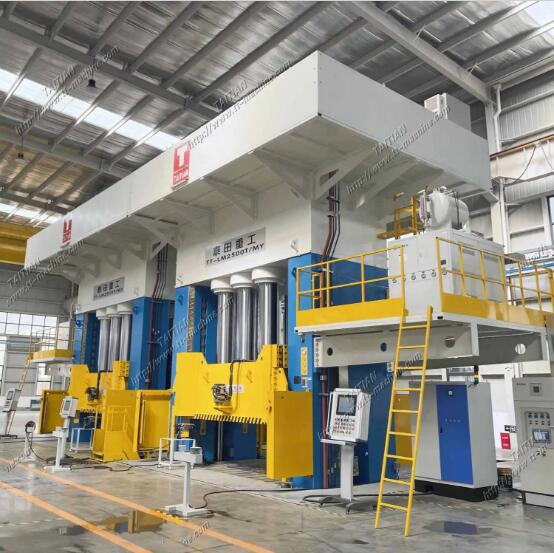How the 2500T RTM Hydraulic Press is Shaping the Future of Composite Manufacturing
2024-09-07
As industries increasingly turn to lightweight, durable, and eco-friendly materials, composite manufacturing has become a cornerstone in fields such as automotive, aerospace, and construction. The 2500T RTM (Resin Transfer Molding) Hydraulic Press, equipped with advanced technology and built to CE standards, plays a pivotal role in shaping the future of this manufacturing sector. In this blog, we will discuss how this innovative press is driving advancements in composite production, improving both efficiency and quality.
1. Driving Innovation in Lightweight Materials
Composite materials, particularly carbon fiber-reinforced plastics (CFRP), have become increasingly important for manufacturers looking to produce lightweight yet robust components. The 2500T RTM hydraulic press enables manufacturers to take full advantage of these materials by optimizing the RTM process.
- Fuel Efficiency in Automotive: The push for lower emissions and better fuel efficiency has led automotive manufacturers to seek out lighter materials for vehicle components. The 2500T RTM press allows for the mass production of carbon fiber composite parts, which help reduce vehicle weight without compromising on safety or durability.
- Aircraft Manufacturing: In aerospace, weight reduction is critical to improving fuel efficiency and reducing operational costs. This press enables the production of large, lightweight components for aircraft that meet stringent safety and performance standards.
2. Advanced Control Systems for Precision Manufacturing
One of the key features of the 2500T RTM hydraulic press is its advanced control systems. These allow manufacturers to precisely control every aspect of the molding process, ensuring optimal results.
- Pressure and Temperature Control: The press features programmable logic controllers (PLC) that allow for precise control of pressure and temperature. This is crucial for the RTM process, where maintaining the right conditions ensures that the resin flows evenly and cures correctly, resulting in a high-quality part.
- Automated Monitoring: The human-machine interface (HMI) enables real-time monitoring and adjustments, allowing operators to detect and correct issues quickly. This reduces the risk of defects, improves product quality, and minimizes downtime.
3. Optimizing Production Efficiency
In industries where production speed and efficiency are paramount, the 2500T RTM hydraulic press excels. Its large tonnage capacity and optimized cycle times allow for the production of high volumes of parts without compromising on quality.
- Shorter Cycle Times: The press is designed to reduce cycle times, increasing overall production output. This is particularly beneficial in industries such as automotive, where high-volume production is essential to meet market demand.
- Lower Energy Consumption: Equipped with energy-efficient servo-controlled hydraulic systems, the press helps manufacturers reduce operational costs by consuming less energy during production. This not only lowers expenses but also supports sustainability goals.
4. Meeting Safety and Compliance Standards
Safety is a top priority in any manufacturing environment, and the 2500T RTM hydraulic press meets the rigorous requirements of CE standards, ensuring it operates safely and reliably.
- CE Certification: Compliance with European safety standards means that the press adheres to strict guidelines regarding electrical and mechanical safety, providing peace of mind for operators and manufacturers alike.
- Safety Features: The press is equipped with numerous safety features, including emergency stop buttons, safety guards, and automatic shutdown systems, ensuring that it can be operated without risk of injury or accidents.
5. Versatility Across Industries
The 2500T RTM hydraulic press is not limited to a single industry. Its versatility and capability make it suitable for various applications across multiple sectors.
- Construction Industry: In construction, the press is used to produce strong, lightweight composite materials for building facades, panels, and other architectural elements that require both durability and aesthetic appeal.
- Marine Industry: The press is also used to manufacture components for boats and ships, where corrosion resistance and strength are essential for long-term performance.
6. The Future of Composite Manufacturing
The advancements brought by the 2500T RTM Forming Hydraulic Press are setting the stage for the future of composite manufacturing. As more industries adopt sustainable and lightweight materials, the demand for high-capacity, efficient presses will only grow.
- Increased Customization: As manufacturers continue to explore new composite materials and applications, the press’s ability to handle complex mold designs and large parts will become even more valuable.
- Sustainability Initiatives: The press also supports sustainability efforts by reducing material waste, lowering energy consumption, and enabling the production of recyclable composites. This aligns with global efforts to reduce environmental impact in manufacturing.
Conclusion
The 2500T RTM Forming Hydraulic Press is transforming the way composite materials are produced, offering manufacturers the ability to create high-quality, lightweight parts at an industrial scale. With its precision control, energy efficiency, and compliance with CE standards, it is driving innovation in industries such as automotive, aerospace, construction, and beyond. As the demand for composite materials continues to rise, this press will play a central role in shaping the future of manufacturing.



